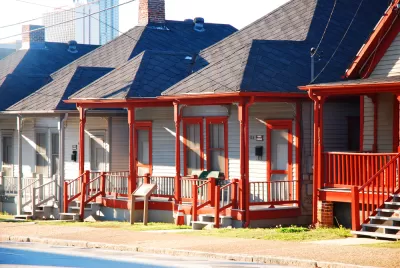LISC and Enterprise, two large community development intermediaries, have announced major racial equity initiatives that emphasize how affordable housing gets built—and who builds it. We take a closer look at what they’re planning.

When Leonard Adams started his journey to build Quest Communities, a nonprofit developer of transitional and permanent supportive housing in Atlanta, he had no connections to the world of community development. He just knew that he wanted to use the properties he owned “for something a little bit better than just being Mr. Landlord,” he says. There was a clear need for housing for people who were trying to exit homelessness and were waiting for open spots in various treatment programs, as well as for those graduating from those very programs, and that’s where Adams started. Quest became a nonprofit in 2001 after a few years on the for-profit side.
Over the last two decades Quest has served about 10,000 households. In 2019 alone it had $38 million worth of construction under way. And still, Adams says when he approaches some lenders, he is still made to jump through hoops that don’t match with his experience. For example, he’s been asked for personal guarantees in recent memory, which isn’t appropriate given his organization’s track record.
Adams is a Black man, and he benefited somewhat from Atlanta being a region with a number of other Black developers, more than in most parts of the country. Although those developers weren’t trying to house the population he was trying to house, Adams still found it difficult to convince traditional lenders to take him seriously. After Quest became a nonprofit, Adams made connections to community development lenders and built a thriving organization, but he did so despite multiple instances of discrimination from lenders, repeatedly needing to prove himself despite his organization’s track record, and steep learning curves as he discovered things he didn’t know his staff needed to know, such as Low Income Housing Tax Credit compliance details.
When Adams first connected to his local office of Enterprise Community Partners, a national community development intermediary, over a decade ago, it was a great relief to find a lender that understood his mission. “There wasn’t a bank in town that was gung-ho about what I was pitching,” he recalls, but Enterprise “immediately understood what we were about. I didn’t have to prove to them why [my mission] was important, we just had to figure out how to make the numbers work.” He has worked with the group ever since, availing himself of all the programs it offers, from lending to leadership training.
But he also noticed that many of those programs were overwhelmingly white—both in speakers and participating developers. And he noticed that the terms on the loans he was getting weren’t much better than those being offered by traditional banks. These are the kinds of things that Enterprise—and its counterpart LISC—are hoping to change with their recently announced racial equity initiatives.
Racial Equity’s Moment?
The murders of George Floyd, Breonna Taylor, and other people of color by police, and the disparate impact of COVID-19 on communities of color prompted moments of racial reckoning in 2020 for many individuals and institutions across the United States, and the community development field was not exempt.
Community development has had an interesting relationship with questions of racial equity. The field ....
FULL STORY: How LISC, Enterprise Hope to Bring More Capital to Developers of Color

Alabama: Trump Terminates Settlements for Black Communities Harmed By Raw Sewage
Trump deemed the landmark civil rights agreement “illegal DEI and environmental justice policy.”

Planetizen Federal Action Tracker
A weekly monitor of how Trump’s orders and actions are impacting planners and planning in America.

Why Should We Subsidize Public Transportation?
Many public transit agencies face financial stress due to rising costs, declining fare revenue, and declining subsidies. Transit advocates must provide a strong business case for increasing public transit funding.

Understanding Road Diets
An explainer from Momentum highlights the advantages of reducing vehicle lanes in favor of more bike, transit, and pedestrian infrastructure.

New California Law Regulates Warehouse Pollution
A new law tightens building and emissions regulations for large distribution warehouses to mitigate air pollution and traffic in surrounding communities.

Phoenix Announces Opening Date for Light Rail Extension
The South Central extension will connect South Phoenix to downtown and other major hubs starting on June 7.
Urban Design for Planners 1: Software Tools
This six-course series explores essential urban design concepts using open source software and equips planners with the tools they need to participate fully in the urban design process.
Planning for Universal Design
Learn the tools for implementing Universal Design in planning regulations.
Caltrans
Smith Gee Studio
Institute for Housing and Urban Development Studies (IHS)
City of Grandview
Harvard GSD Executive Education
Toledo-Lucas County Plan Commissions
Salt Lake City
NYU Wagner Graduate School of Public Service





























